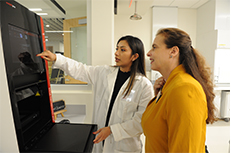News Story
Biocomputational Engineering Program at UMD Earns ABET Accreditation
The Biocomputational Engineering (BCE) program at the Fischell Department of Bioengineering (BIOE), located at the University of Maryland, Shady Grove campus, has reached a significant milestone, becoming the first Biocomputational Engineering program in the United States to receive accreditation from the Engineering Accreditation Commission of ABET. This accomplishment, achieved less than four years after the program’s inception, marks a crucial advancement in this interdisciplinary field.
“I am really proud of such a milestone achievement accomplished in less than four years by the BCE team,” says BCE Program Director Lan Ma. “Faculty, staff, and students have worked extremely hard to build this program from the ground up, particularly during the challenges of the pandemic, to deliver high-quality teaching and meet ABET’s rigorous evaluation standards.”

Launched to bridge physical sciences, biological sciences, and computational techniques, the BCE program equips students with specialized skills in programming, modeling, and machine learning. Graduates are prepared to apply these skills in rapidly growing fields such as public health, biotechnology, and data science. Since its inception, the program has graduated its first cohort in Spring 2023, with an expanding student base and faculty dedicated to education and industry collaboration. The program partners with institutions like the Institute for Bioscience and Biotechnology Research (IBBR) and the National Institute of Standards and Technology (NIST), providing students with hands-on experience essential for career readiness.
ABET accreditation is highly regarded in technical fields, often serving as a qualification benchmark for employers and graduate programs. For BCE graduates, this accreditation assures employers that their education meets global standards for technical excellence, making them highly competitive in fields that demand computational and analytical expertise.
A distinctive feature of the BCE program is its interdisciplinary curriculum, blending the latest advancements in data science, AI, and biotechnology. “Our curriculum includes advanced topics that are typically introduced at the graduate level,” Director Lan Ma says. "This student-centered program provides a solid foundation in math, computer science, biology, and engineering, complemented by substantial project experience. This allows students to acquire the skills needed to address complex healthcare and biomedical challenges with innovative, data-driven solutions.”
The program also emphasizes foundational knowledge in artificial intelligence (AI), with a focus on biomedicine and healthcare applications. Students gain experience working with extensive biomedical datasets, such as medical images and protein spectra, while learning about AI from technical, ethical, and engineering standards perspectives.
As the demand for expertise in data science and AI continues to grow, UMD’s BCE program aims to prepare its graduates for impactful careers in biotechnology, healthcare, and related fields. The achievement of ABET accreditation not only establishes a high standard of educational quality but also underscores the program's dedication to producing graduates who are well-prepared to lead in the emerging field of computational biology.
Published November 14, 2024










